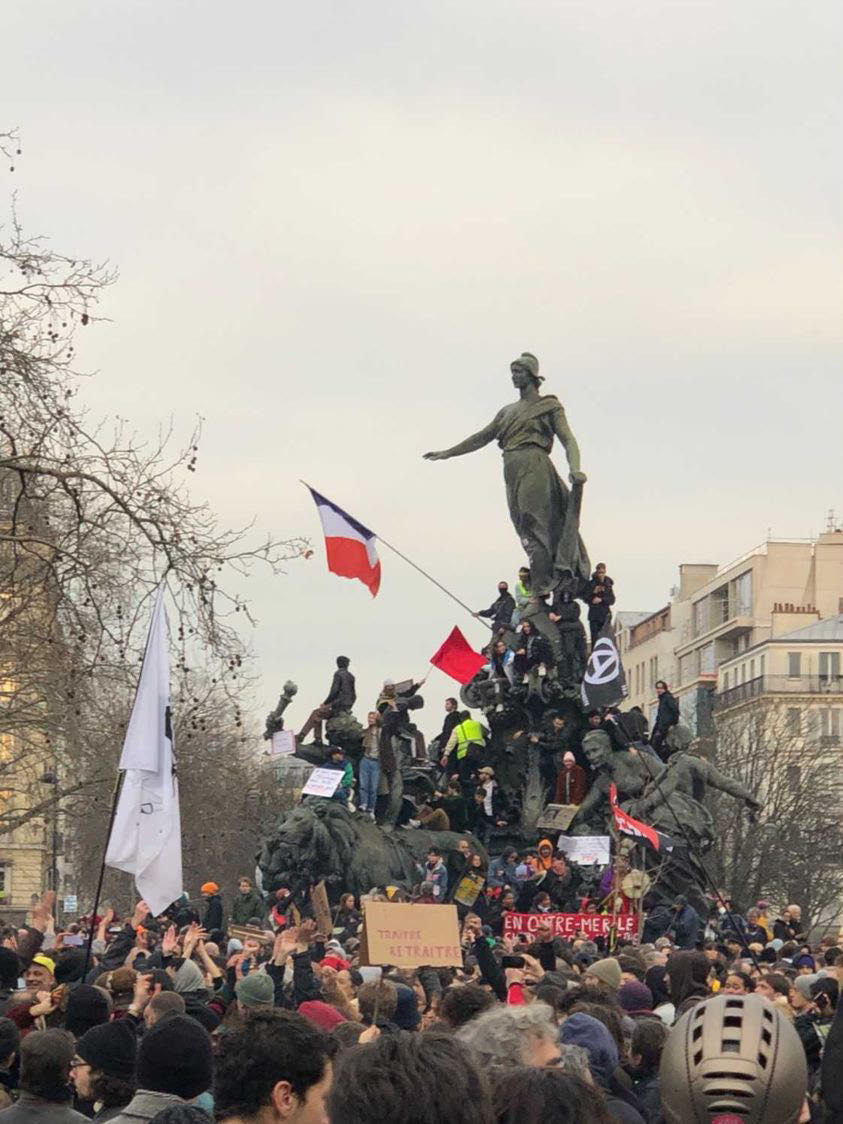This article is an opinion piece and its contents represent the standpoint of its author, not UPF Lund or The Perspective’s editorial board.
Most European countries have their legal retirement age at around 65 due to increasing demographic challenges, yet Emmanuel Macron’s recently enacted law, which raises pensions from 62 to 64 years, received a strong collective opposition. The public’s violent response to this law demonstrated by hundreds of mass protests all around the country might look extreme to an outsider. Yet examining this popular uprising shows us that the pension reform law was not enacted in the most democratic manner.
The presentation of the pension reform draft on January 10 took place during a so-called social crisis context. After the COVID-19 economic downturn, austerity came with persistent inflation. What is more, according to the European Central Bank, despite record-breaking profits gained by certain big companies during and after the pandemic, prices have remained high. Hence, this feeling of unfairness—weighing on the French tightening their belts for too long—was exacerbated by the particularly unfair reform presented by the French prime minister in January.
After the announcement of the draft, more than 70% of citizens declared being generally opposed to the reform. But the reasons behind this discontent go beyond the two years added to the retirement age—the implementation of this reform will penalize the ones who started working early. It also negatively affects women who often face incomplete contribution years due to childbearing since the reform will increase the career years required to receive a full pension. The opposition claims that in the long run, according to the Pensions Advisory Council, the pension system will break even and that there are other ways to overcome the deficit caused by the demographic change. Still, with already weak working conditions and shorter life expectancy of the poorest fringe of the population in France—this reform is unwelcome to the people, who are receiving full support from the unions.


As part of France’s democratic system, the law was put to a vote in the parliament, where Macron’s party rules without an absolute majority. The Assemblée Nationale’s 175 hours long debate ended without an agreement on the law, as a result of a blocking strategy from different opposition parties. Framing the reform as unavoidable and fearing a defeat during the vote, prime minister Elisabeth Borne instead forced the acceptance of the new law with the 49.3 article of the constitution. This special paragraph of the French constitution allows governments to pass a bill without the vote of the parliament. This decision on the 16th of March marked the eleventh time Macron’s government overcame the parliament in this way. This political move, seen as anti-democratic for many, caused the injustice to boil over and escalate into many protests and strikes all around the country.
Responding to the union’s common call, nearly 1.3 million protesters took to the streets, calling for the withdrawal of the reform but also progress on urgent issues such as climate change and an adequate wage increase to face inflation. On the political side, while Macron refused to talk with union leaders, two political parties tabled a motion of no confidence for the government. The final vote on March 20 could have led to the toppling of the government on top of rejecting the pension reform. However, the opposition failed, missing only nine votes.
Far from demotivating the protesters, their number increased up to two million according to the union’s estimation after the failure of the no-confidence vote. While Macron denied the legitimacy of the crowd in his March 22 interview, hundreds of thousands of protests and strikes took place in France, countered often by excessive force from the police. Across France, some protesters desperate to be heard looted everything in their path and seemed to target especially what could be perceived as belonging to the upper classes. Expensive cars, travel agencies, banks, bins piling up due to the strike of collectors, and ads were among the countless things burnt in this revolutionary atmosphere.
Still, as most of the protesters remain peaceful, the disproportionate show of force from law enforcers, arbitrary arrests, and censorship of reporters remains unjustified.
Interior Minister Gérald Darmanin claimed that police forces aim to protect the peaceful protesters, yet his word was questioned when footage emerged of the arrest of many people without charges, excessive use of tear gas, strikes in the face of protesters, and other questionable police tactics. Fueling violence on the streets, this vicious cycle endangers the right to freedom of assembly as well as the freedom of speech, since many journalists reported being victims of violence and intimidation.


Supporting this unrest, the political opposition called for a referendum and a verification of the law in the Constitutional Council. The constitutional body, responsible for verifying the conformity of proposed laws with the constitution, approved the pension reform bill and rejected the referendum proposition. In addition, the council rejected the six essential concessions gained by the opposition to make this reform fairer. Those add-ons aimed at, for example, incentivise companies to hire older people or compensate those who started working early to avoid penalizing the most vulnerable.
After this decision on the 14th of April, most unions pushed to pursue the collective effort by planning massive protests for the 1st of May, arguing that people must fight until the withdrawal of the reform. While Macron stated in his last speech welcoming all trade unions to move forward on its political agenda considering the pension reform case closed, most of them rejected his offer, stating that they had not been heard for negotiations of the reform.
At the core of a democratic and social crisis, this massive uprising teaches us that broken communication between a population and its political representatives leads to nothing good. Indeed, the opposition denounces the disconnect between the elite ruling the country and most French people who must face challenges such as inflation, oil shortage, or decreasing healthcare and education services. The president claims that his election gives him the legitimacy needed to implement such unpopular reform. Yet, it is clear that to many French people, voting for Macron was a default choice to avoid the far-right candidate, Marine Le Pen.
In this atmosphere, one thing is sure—France’s democracy is endangered by its government, and knowing the attachment of French people to its freedom of speech and assembly, we can only expect larger and more active protesting if nothing changes in Macron’s political tactics.
By Anaïs Colin








